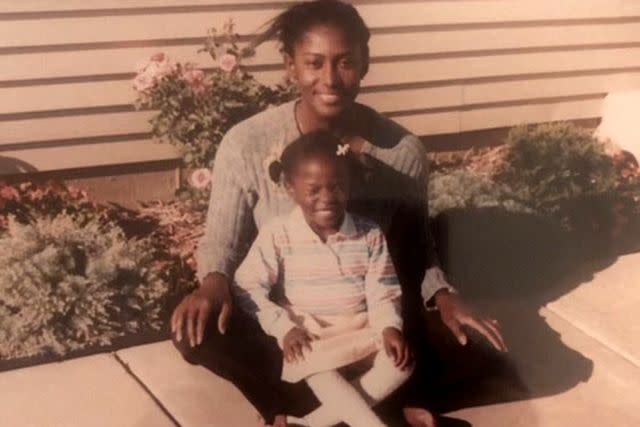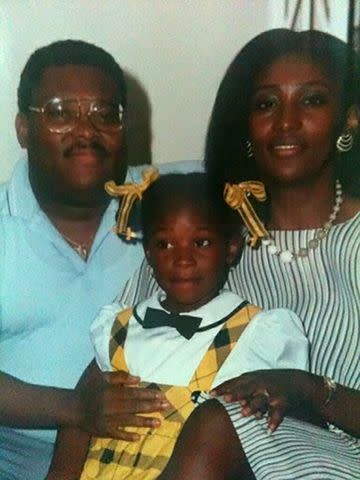Daughter of Haitian Immigrants Says Trump's 'Eating the Pets' Comment Opens Old Wounds: 'It's So Ignorant' (Exclusive)
Melissa Chataigne, a Midwest-born stylist whose parents immigrated from Haiti, tells PEOPLE why the former president's much-memed debate quotes are "dangerous"

Hannah Beier/Bloomberg via Getty
Donald Trump speaks to reporters in the spin room after his debate with Kamala Harris on Sept. 10, 2024Donald Trump's baseless claim about Haitian immigrants eating their neighbors’ pets drew immediate disbelief, laughter and then condemnation from Vice President Kamala Harris during Tuesday night’s presidential debate.
ABC News anchor David Muir interrupted the former president, 78, to correct his falsehood and told viewers that their reporters had already reached out to city officials in Springfield, Ohio — where Trump claimed he had “seen people on television” talking about it — to verify there had been “no credible reports of specific claims of pets being harmed, injured or abused by individuals within the immigrant community.”
But to many Haitian people watching at home, the damage was already done.
Melissa Chataigne, a first-generation Haitian American whose parents legally immigrated to the United States before she was born, tells PEOPLE that Trump's debate comments to tens of millions of viewers “stung."
“It's so ignorant, and I don't understand why Haiti, which has been through so much, always seems to be this punching bag for American politics,” the Los Angeles-based stylist says of Trump’s rhetoric. “Enough is enough.”
Chataigne took to TikTok immediately after the debate and, using audio of Trump’s quote about Haitian immigrants, she posted a clip of her holding up her dog.
“Haitians eat pets?” text reads over the video, as Chataigne holds up the dog and repeatedly kisses its head. “As a proud Haitian American I do declare chiweenies are the sweetest.”
The TikTok was created in jest, but days removed from the debate, Chataigne says there’s a more painful reality that Haitian people can’t always laugh off when they’re faced with racist and fear-mongering rhetoric like that of Trump’s on Tuesday night.
“I made a joke about it because I found it was just so absurd, but it's also very hurtful,” Chataigne says. "It was like, 'Wait, why are we the butt of the joke again?' "
BBC reports that the racist rumor first took off when Republican vice presidential nominee J.D. Vance began spreading the falsehood on social media.
The outlet reports that Vance, who doubled down on the claim after Tuesday's debate despite city officials debunking it, appears to have picked up the falsehood from a local social media influencer who attended a Springfield, Ohio, city council meeting and complained about the outlandish scenario without providing evidence.
Trump then repeated the false claims on the debate stage, bringing the conspiracy theory into the national spotlight.
"I felt because he was getting outdone in the debate with his answers, he shoots from his hip and says something that he maybe heard once, maybe heard about, doesn't really know the facts on, and then puts that out into the world and his followers are like, 'This is true,' " Chataigne suspects. "It's just a very dangerous way of politics."

Melissa Chataigne
Young Melissa Chataigne with her motherChataigne says the former president’s use of a national platform to spread lies about her community opened old wounds, telling PEOPLE she was routinely bullied growing up because of similar, persistent stereotypes about Haitian immigrants.
“I'm just so frustrated because it's like in the 1980s or early 1990s when Haitians were coming to Florida and they had them on rafts," says Chataigne, who was growing up in suburban Illinois at the time. "I was made fun of as a kid ... because there was this whole false stigma that all Haitians brought AIDS to the United States. And so if I was sick, it's like, 'Oh, Melissa's sick because she had AIDS.' "
Reflecting on it now, Chataigne acknowledges that she wasn't proud of her identity at the time because of the prejudice she faced.
"I would hate to have that same experience happen to a younger generation that is now hearing this in the home and bullying kids, because that was my experience," she adds. "It's crazy to think once again, in this new millennium, it's these same old tactics of fear-mongering against a beautiful country that has endured some of the most horrific tragedies of our time.”

Melissa Chataigne
A childhood photo of Melissa Chataigne with her parents, who immigrated from HaitiChataigne says that in reality Haitian culture is "beautiful and vibrant," heavily centered around family and hard work.
"If you want to look at a group of people that have strong family values and community, it's really the Haitian community," she tells PEOPLE. "Most of the Haitians that are in this country came the legal way and worked their way up and have worked very hard."
Never miss a story — sign up for PEOPLE's free daily newsletter to stay up-to-date on the best of what PEOPLE has to offer, from juicy celebrity news to compelling human interest stories.
Chataigne, now a successful style expert in her own right, notes that her parents instilled a strong work ethic in her household. Both of them sought higher education in the United States and built careers, with her mother becoming a nurse and father becoming a business executive.
"My mom particularly was the oldest of eight and she came here as an English second language student and went to Evanston Township [in Illinois]," she says. "I just think of myself in high school and hard it was to adjust, but then being here as a sophomore not speaking the language, I just give my parents so much credit because my mom ended up graduating."

Melissa Chataigne
Melissa Chataigne, right, with her motherChataigne worries that Trump’s much-memed "eating the pets" rhetoric overrides the many success stories of immigrants giving back to their communities — and that it'll incite violence, especially in Ohio, if someone who watched the debate believes Trump “verbatim” and makes judgments about a person of color who might be walking their dog or interacting with an animal.
“It's a joke now,” she says, “but I just pray that it just stays a joke."
On Thursday morning — following PEOPLE's conversation with Chataigne — Springfield, Ohio, officials closed down multiple government and school buildings in response to a bomb threat. The Springfield News-Sunreports that the threat was made by someone who was angry with the city's handling of Haitian immigration.
For more People news, make sure to sign up for our newsletter!
Read the original article on People.
